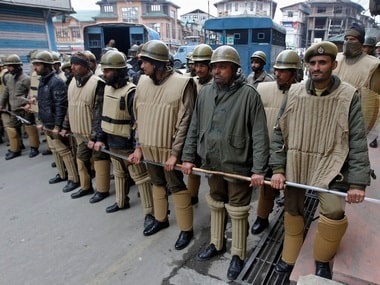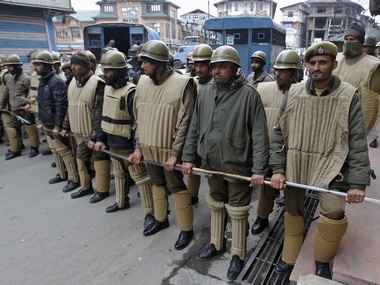Through 28 years of violent turbulence in Jammu & Kashmir, there have been many organisations which have stood the test of time, attrition, pressure of continuous operations and even social ostracisation, but none like the Jammu and Kashmir Police (JKP). Those of us from the Indian Army who have operated in the state over many years, at the Line of Control (LoC) and the hinterland, fully realise that the Army units and personnel have intervals of a fair length of time before they return to the turbulent environment of the Valley. Without taking away anything from the Army’s tremendous achievements, most soldiers would agree that the challenge faced by the near continuous presence of JKP personnel in the operational environment is a severe test of nerves. During the heights of curfew, when street turbulence rocks the state, I have seen JKP personnel walk back to their work places from their homes at the appointed hour. Many could have offered excuses of their inability to step out of their homes, which lie within the folds of those very built-up areas where supporters of terrorists and separatists reside. During joint operations conducted by the Army, CRPF and JKP, the role played by the JKP is larger than life, with intelligence, feel of the local pulse, guidance, liaison and the like being their forte. It bears the brunt of stone-throwing along with the CRPF, and remains in the forefront to support anti-terror operations of the Rashtriya Rifles (RR). Through the nineties and the early millennium, there were efforts to target policemen even when the strength of terrorists was much higher, but those attacks were never executed as a part of a focused campaign. In fact, the separatist camp did realise that during the campaign of 2008-10 street turbulence, one of the failings on their part was the inability to target the JKP, thus allowing its full organisational effectiveness to be brought to bear on the streets. Learning their lesson in 2016, after the triggering of mass protests in the wake of Burhan Wani’s killing, the separatists and terror groups targeted the JKP personnel by acts such as burning of their homes and ostracisation of their families in the villages and small towns. The aim was to demoralise the police force and prevent it from effectively pursuing its duties. Despite advice to the state government, no effort was made to overcome this situation through timely compensation to the affected personnel. Some families of police officials were forced to apologise at mosques. Yet, the JKP remained intact in its discipline, even with a large part of the personnel being from the Valley. [caption id=“attachment_5089981” align=“alignleft” width=“380”]  File image of Jammu and Kashmir Police personnel. Reuters[/caption] After Burhan Wani’s killing and the targeting of police families and personnel, there was a downturn in the quantum and quality of flow of actionable intelligence for some time during 2016-17. The army felt the impact of it as its operations had to slow down. However, as the JKP rallied to reoccupy the vacated police stations in south Kashmir, its confidence, too, returned and a restored effectiveness was experienced. It needs to be appreciated why policemen are more vulnerable in Kashmir than soldiers of the army. Deployment of the army is always in larger sub-units and never in penny packets like the police, which has a less regulated command and control for deployment of its personnel. Special Police Officers (SPOs) remain a misnomer; they are mostly poorly paid and trained, with no idea of how to respond tactically to threats. Traffic policemen are unarmed and remain deployed singly or, at the maximum, in pairs. The Special Operations Group (SOG) also works in small teams, but not so small as to be isolated and targeted. For conduct of operations beyond intelligence gathering, its personnel work in close concert with army units, which gives them inherent security. The vulnerability is highest of the Station House Officers (SHOs) and their staff at police stations, which is not so numerous as to afford the required overkill for ensured security. SHO Feroz Dar of Anantnag was killed in 2017 in an ambush along with six of his men. Four policemen were killed on 29 August, 2018 when they were ambushed while escorting the local DSP of Shopian. The thing to remember about vulnerability of policemen is that armed police units live mostly in police lines, but personnel manning police stations mostly live among the people and many times in their own homes. Under normal circumstances, that is the best way of policing, with local policemen in the know of everything in and around their abodes. However, with terror threats, this makes these policemen most vulnerable . It is a challenge to regulate their work place deployment, home and family security in the face of their targeting by terrorists. The challenge becomes even more intense when there is complete transformation in the nature of terrorism, which has become locally inspired and manned by the youth of south Kashmir. The reasonable degree of local sanctity and immunity that JKP personnel enjoyed in the pursuit of their profession has now eroded as it is primarily the local terrorist who is targeted by the policemen in conjunction with the army and the CRPF. With higher alienation, the people may well have developed a greater reluctance to identify them as ‘their boys’; the terrorists perhaps may have grabbed that title. In such a scenario, only two things can work in securing policemen. The first of these is to exploit the obvious abhorrence towards terrorists who have targeted police families by kidnapping innocents. While many may speak of ‘tit for tat’ type of operations to target terrorist families, this temptation must never be succumbed to. There is a thin dividing line between the sanctity of violence and counter-violence. Once that is crossed, it will be difficult to stop this from becoming an uncontrolled mayhem. The JKP’s strength has always been its discipline and strong loyalty; let that not be compromised. With that, it is necessary to rally the people to rise against terrorist atrocities and isolate terrorist families without physically harming them. The second way of securing policemen will have to be more out of the box and involve grouping for functioning. Deployment in way off locations will need to be curbed. In villages, policemen must reside in clusters too. Police stations will need to be secured by a greater strength of CRPF personnel. Local movement will need to be done with greater care and discipline without giving indicators. In policing duties, these are difficult to achieve, but ultimately discipline is the only answer, and the JKP is doing well to get back some of its older and more experienced personnel from deputation. Every experienced hand is needed on the deck to turn around a situation. The JKP leadership must relish this challenge and prove equal to it. The author is a retired lieutenant-general and former general officer commanding 15 and 21 Corps
It needs to be appreciated why policemen are more vulnerable in Kashmir than soldiers of the army.
Advertisement
End of Article


)

)
)
)
)
)
)
)
)



